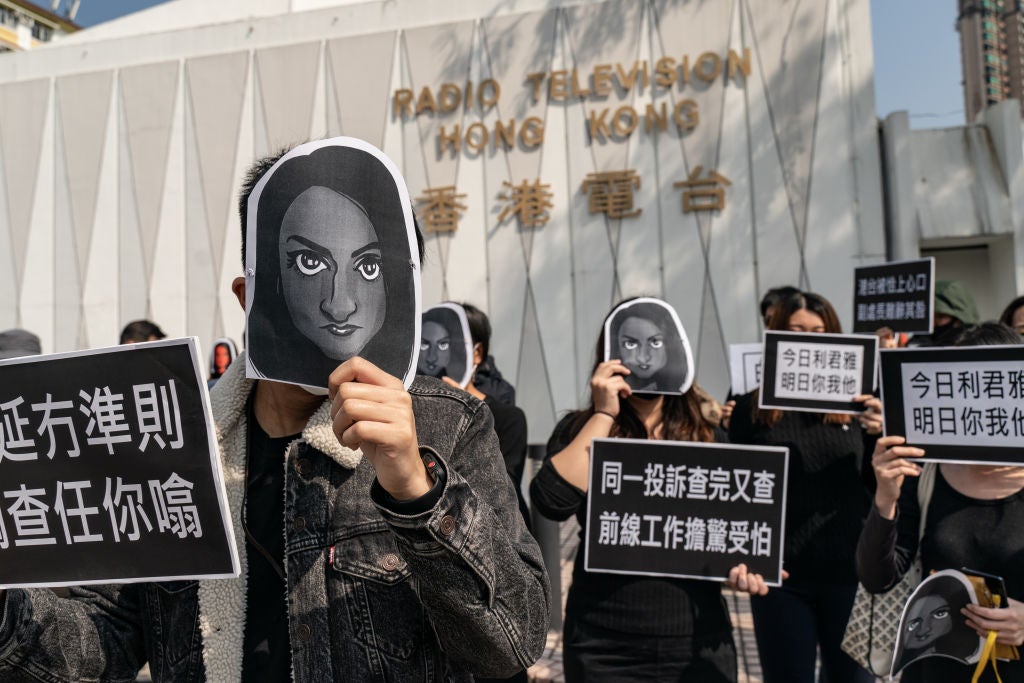Hong Kong’s ‘BBC’ ordered to support China national security
Chinese government angry at broadcasters coverage of 2019 riots

Your support helps us to tell the story
From reproductive rights to climate change to Big Tech, The Independent is on the ground when the story is developing. Whether it's investigating the financials of Elon Musk's pro-Trump PAC or producing our latest documentary, 'The A Word', which shines a light on the American women fighting for reproductive rights, we know how important it is to parse out the facts from the messaging.
At such a critical moment in US history, we need reporters on the ground. Your donation allows us to keep sending journalists to speak to both sides of the story.
The Independent is trusted by Americans across the entire political spectrum. And unlike many other quality news outlets, we choose not to lock Americans out of our reporting and analysis with paywalls. We believe quality journalism should be available to everyone, paid for by those who can afford it.
Your support makes all the difference.China has further curtailed press freedoms in Hong Kong after staff at the territory’s embattled public broadcaster were forced to support national security laws and the interests of the Chinese government.
Radio Television Hong Kong (RTHK), founded in 1928, is the only publicly funded media outlet on Chinese soil and is sometimes compared to the BBC in the UK.
The Hong Kong and Chinese governments were angry about the network’s coverage of anti-government protests that swept the city in 2019 over draconian security laws, which critics said tore up civil liberties and crushed dissent against Beijing.
RTHK said a detailed document was issued to staff setting out its editorial responsibilities, policies and procedures. It follows criticism in a government review in February.
The broadcaster reported the document, issued by management, stressed that RTHK programmes must not provoke or deepen hatred, discrimination or hostility towards the Beijing or Hong Kong governments.
It states that "under no circumstances should our programmes provide a platform to encourage, incite, promote, glorify, endorse or sympathise with any act or activity endangering national security or otherwise contain any contents which are contrary to the interests of national security”.
Staff that did not comply risked disciplinary action.
Responding to the new government rules, RTHK said in a statement the "document seeks to assist RTHK staff and its service providers to acquire a thorough and comprehensive understanding of RTHK’s editorial policies and guiding principles".
Since China’s new security laws came into force, authorities have arrested and jailed activists, seized assets of democracy campaigners, detained newspaper editors, banned books and protest slogans and also censored films.
Hong Kong returned to Chinese rule in 1997 under a "one country, two systems" agreement that promised it wide-ranging freedoms unavailable on the Communist Party-ruled mainland.
Protests that roiled the city in 2019 were fuelled by perceptions that Beijing was tightening its grip on those freedoms, which authorities have denied.
RTHK’s role has come under increased scrutiny as the government implements its national security law.
The document "would enable RTHK to better fulfil its public purposes and mission as a public service broadcaster, and its responsibilities as a government department", a press release on RTHK’s website said.
"RTHK is editorially independent under the Charter. This point is reaffirmed in the document. However, editorial autonomy also involves responsibility," the press release said.
RTHK quoted Kitty Choi, an adviser to the director of broadcasting, saying that staff could continue to interview people who were critical of the government.
The document also reminds staff to avoid contacts with foreign governments or political organisations to prevent conflict with their official duties.
They must also be cautious in their use of social media.
Some staff expressed confusion and concern to Reuters. "I’m not sure that I will be able to produce any more programmes that aren’t directly in line with the government’s stance," one staff member said.
The memo follows several recent moves by the government to overhaul the broadcaster, with a review in February finding deficiencies in its editorial management and a lack of transparency in handling complaints.
A senior civil servant, Patrick Li, was appointed as director of broadcasting in March.
Reuters
Join our commenting forum
Join thought-provoking conversations, follow other Independent readers and see their replies
Comments